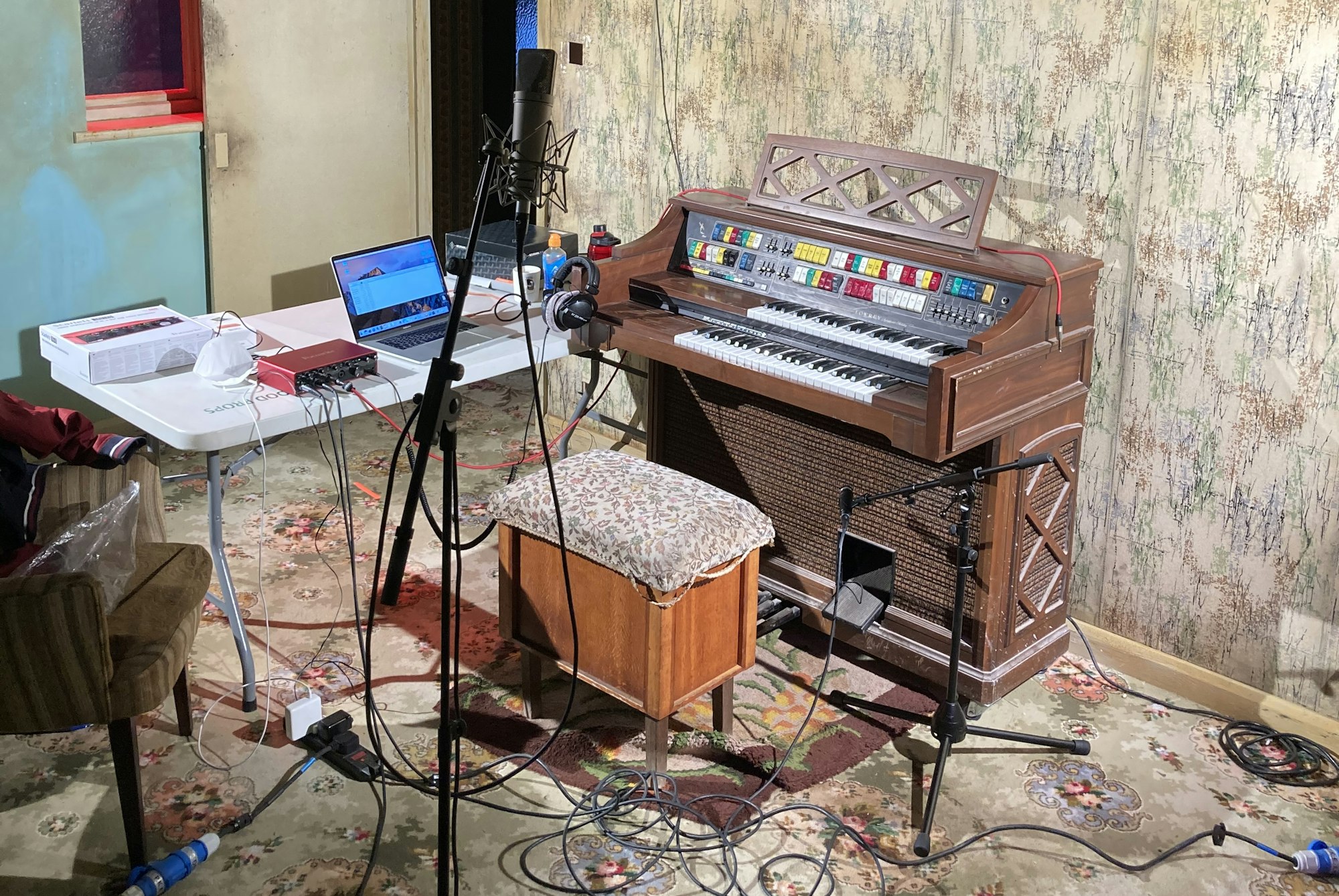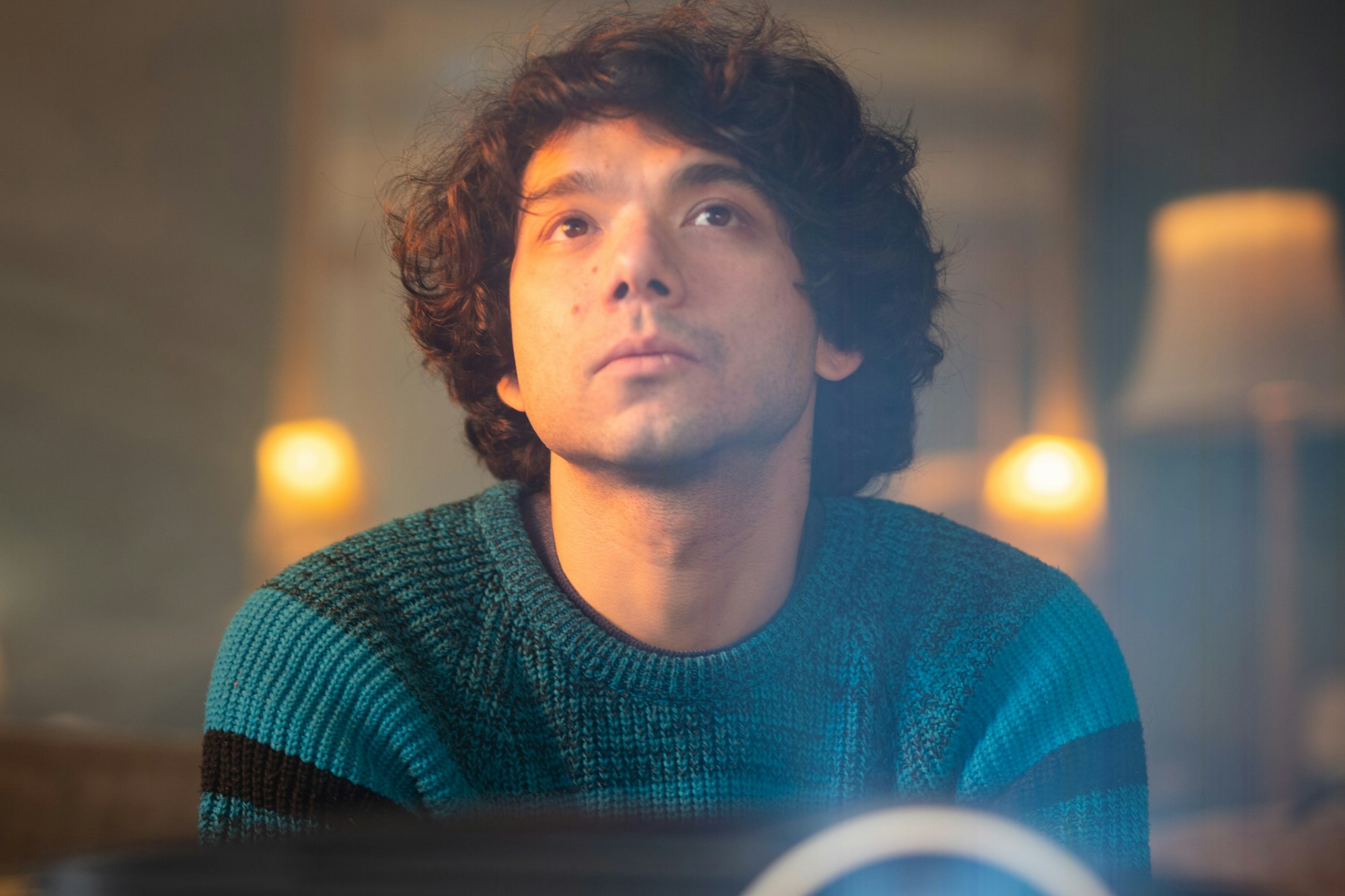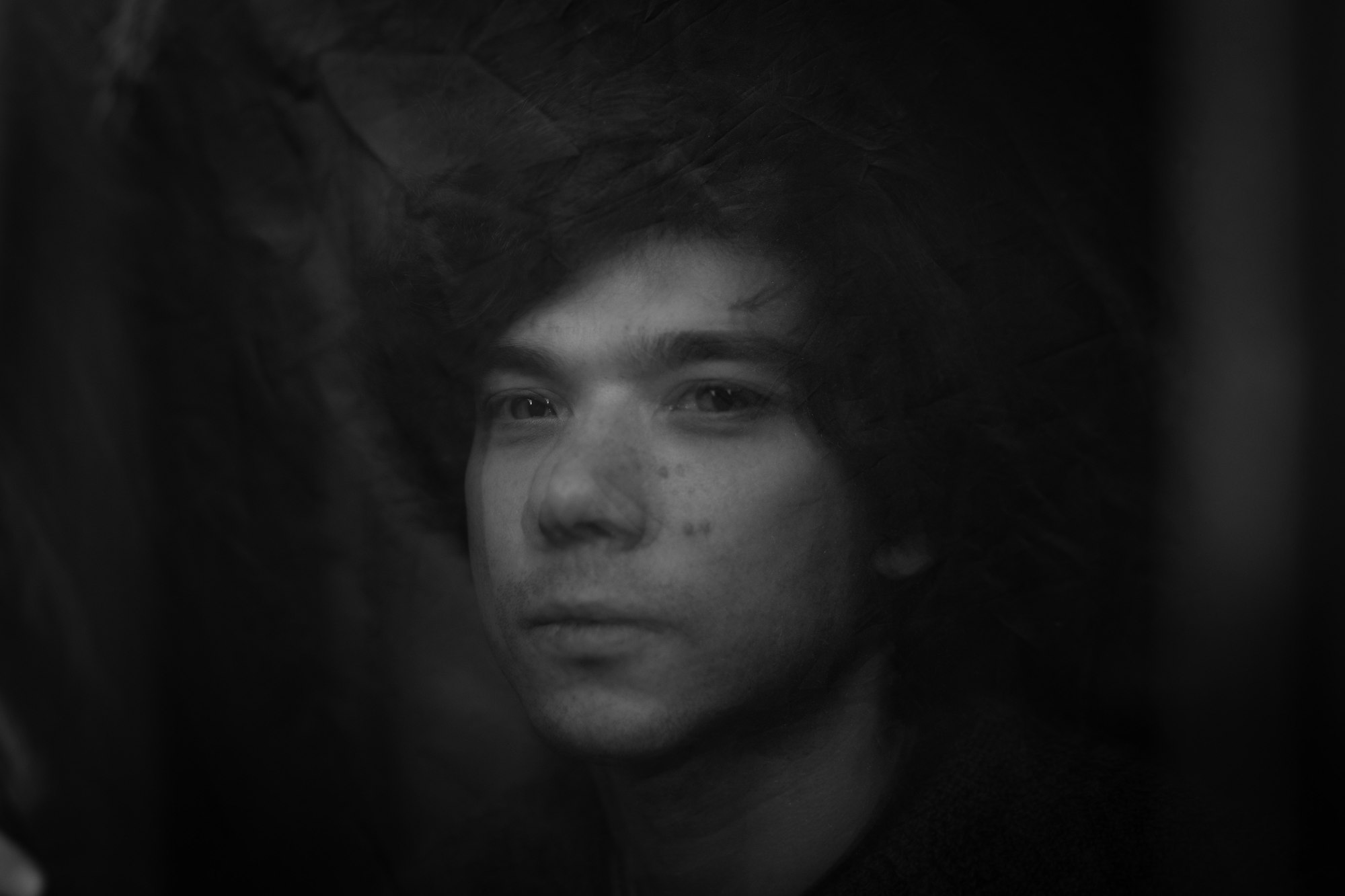Words by Charles Steinberg
When Arthur Sharpe recently completed a marathon run of composing for a film and miniseries, he was anticipating a window of downtime. But not long after his projects had wrapped, his director brother Will sent a message: “Is it too early to start thinking about music for something if I haven’t even begun writing the script yet?” As Will Sharpe has emerged as a bright new voice in writing and directing, Arthur has set the pace, providing the score for Will’s original cult-popular series Flowers, his newest film The Electrical Life of Louis Wain, and most inventively for the recent HBO/Sky miniseries Landscapers.
Though Arthur Sharpe’s contributions are not exclusive to Will’s projects – he has also scored the UK shows Ghosts, Guilt, and Women on the Verge – the brothers have established such a natural creative relationship that their collaboration has become almost presumed. Whenever the gears start turning in Will’s head and the imagery of a concept takes form, Arthur is the first to know. Still, neither wants to take the other one for granted.
Each team-up on a production for the Sharpe brothers has brought a larger audience, most recently for the Olivia Colman headlining Landscapers. Arthur’s wide-ranging, complex score elevates the limited series that takes some artful angles on the bizarre true crime story of Susan and Christopher Edwards, the British couple convicted of the murders of Susan’s parents and financially driven cover-up.
With surprising dexterity through styles, Sharpe’s music for Landscapers exceeds the common use of foreboding drones to intensify the quagmires of a true crime while also romanticising the escapist fantasies of a couple trying to outrun their reality and culpability. At times his score sympathizes with the idiosyncrasies that can push people to the fringes of society, at others, it shoves them further into obscurity.
Throughout his brother’s dramatisations that have frequently landed on the predicaments of outcasts, Arthur’s music has brought dimension and humanity to what is so often dismissed as odd, from the comical to the tragic. By the sound of it, he’s just gotten started filling in those spaces lurking behind the face of what’s revealed and what’s kept inside.

Your music for Landscapers demonstrated fluidity through the motifs of spaghetti westerns, old detective/film noirs, and classic Hollywood romances. It made me wonder if your musical appreciation was broad from early on. Do you have a number of comfort zones in writing?
I didn’t develop a huge appreciation for music for the first few years of my life, which coincided with me living in Japan because that’s where I was born. I guess I didn’t like the pop music there. I do remember that our car’s cd player was broken so whatever you put in there got stuck for months. So I’ve probably listened to the Whitney Houston soundtrack for The Bodyguard as much as some of my favourite albums just because it was stuck in there so long. Then it was replaced by The Best of The Bee Gees. I can’t help but think those and other stuck records must have played some part in the underlying way I write music [Laughs]. Exactly what that is, I don’t know.
As far as comfort zones, I never really think about them because the moment you’re too settled is when you stop surprising yourself and you’re not writing as well. Landscapers came from and went to a number of different places but maybe was grounded in a comfort zone out of which I’m trying to break.

Were you and your brother always creatively intertwined?
Very much so. It’s been that way since our teenage years and as a result, that relationship has grown organically. Where Will wanted to be a bit of everything – an actor, a director, a writer, a musician – I was focused on music. I was playing in guitar bands around the same time Will began to direct and he would sometimes play my music in the things he wrote and directed for theatre. It was the kind of stuff I was writing anyway on an 8-track in my parent's attic. That was basically the birth of our director–composer relationship.
The groundwork of what we’ve done creatively has always been there. Our tastes in music and art are similar but not identical, which is helpful because we react to things the same but also push and pull one another in unexpected directions. Will always wants me to experiment because he wants to be surprised. It’s not all successful but it’s equally useful to get something slightly left of what was hoped for.
I think my brother recently said on a podcast that we don’t get into bust-ups like the [Oasis] Gallaghers but we each have things that we feel strongly about and we’ll defend our corner if we think it’s worth it. I think that’s one of the advantages of working with a sibling; you’re not afraid to make your voice heard as you might with a director you’re working with for the first time – someone you don’t have a dynamic with and who you don’t want to lose a job with.
The groundwork of what we’ve done creatively has always been there. Our tastes in music and art are similar but not identical.
Do you remember when you both started to discuss film and television and what you like and disliked about what you were watching? What were the kernels of your collaboration?
It’s a bit difficult to remember at what stage growing up that you start watching things with a more discerning eye, but we were definitely both really into David Lynch. Lynch might be my favourite director. We love how he is visually, creatively, maybe nonsensically, certainly enigmatically, and obviously musically.
He’s got a great ear for music. It’s unbelievable.
For both soundtrack and score. Angelo Badalamenti’s Twin Peaks theme is amazing. Definitely not what you would assume. Twin Peaks is quite a dark murder mystery but you have this quite wistful, romantic-sounding theme. For the people familiar with that show, it’s so ingrained in the mind but at the time you wouldn’t automatically think that’d be the way to go.
I felt like your choices in Landscapers were unexpected as well. The score so richly fleshes out Susan’s fantastical escapes from her troubled reality.
The one thing Will and I both knew is that because of Susan’s infatuation with Hollywood and clean-cut western heroes, the music would reinforce the sense of her living in her own fantasy world. There are moments when the music is kind of unashamedly romantic because of that. But we knew that we didn’t want the music, or the series as a whole, to just be references to the cinematic eras she’s imagining.
It was important to have parts of the score that reflected the darkness of their real situation. The music that’s more representative of the fact that there have been murders [that have legal consequences]. There was a push and pull between the two sides. Sometimes there was this fully-fledged romantic cinema style with melodic strings and woodwinds, and then you go into the darker half with percussion and metallic clangs and noises that are disturbing the Hollywood ideal that Susan is desperately trying to live in. The music lands somewhere in the middle depending on where Susan is mentally.
There was a lot of experimentation with taking melodic orchestral elements and peppering them with unfamiliar sounds.
How did you give your own treatment to the traditional styles of writing for crime procedurals and classic Hollywood fare?
Probably the most referential piece of music is the one that sounds like the Morricone spaghetti western, which comes in when Susan is watching High Noon and Chris is emailing the police. I had my own theory – and I don’t know because I can’t speak for Susan – but she probably wouldn’t have liked the Sergio Leone/Morricone westerns because what she loved was the clean-cut western hero. Leone brought in more troubled anti-heroes. So even though Susan is watching High Noon, we’re not hearing that kind of music. We're hearing the more troubling Morricone style. In my mind, Susan imagined lush, romantic scenes and got carried away with adventure, when actually the reality of her situation is something you’d see in a Leone film. She’s in trouble and things aren’t going right.
There was a lot of experimentation with taking melodic orchestral elements and peppering them with unfamiliar sounds that aren’t from those classic eras of cinema. I recorded things like the clanging of metal chairs and table lamps, industrial work in the distance, and fuzzy noises that disturb and purposefully clash with the traditional orchestra. I was also taking that traditional orchestral sound and seeing how to make it darker with techniques like hitting the strings on the wooden side of the bow, which isn’t uncommon but probably wasn’t used much in traditional Hollywood music.
In the final episode, it was interesting to have one long piece of music that has a central shape and progression but changes in mood depending on the emotionality of what’s happening. It highlighted the dramatic shifts that occur within a long sequence.
Episode four was where Will wanted us to really get inside Susan’s head. I remember Will saying they’d be using a lot of wind sound effects in this final episode to create tension. Even in the court scene where there obviously wouldn't be any wind. He asked me what the musical equivalent might be for that to create the same kind of tension. From that came the idea to take a lot of strings to their extreme top end. There was a string quintet and all were playing at the highest point they could hit. I wanted that to come in and out constantly with clashing notes and lots of discordance. But we didn’t want it to just sound disastrous for everything going wrong for Susan because she’s still clinging on to her fantasy world.
Where the notes changed from minor to major depending, we wanted to go from everything being fraught to, “Hang on, did I get a glimmer of hope there?” The hope is desperately trying to push through but when it does, it’s fleeting. As you say, that long cue was continuous and I wanted it to reflect Susan’s state of mind with that hope poking through but ultimately being defeated.

There were unconventional and theatrical ways of avoiding the confinement of the interrogation room for the recounting of events, which made things more visually and temporally exciting. The characters actually break the fourth wall at one point in going between sets on a soundstage with a cameraman following them. Does that kind of experimentation give you more license for musical experimentation?
Will is interested in every aspect of filmmaking, behind and in front of the scenes. He likes to break out of the restrictions of reality and see where the mind can go on screen, rather than just key on what the eyes can see. Because in Landscapers we have a central character in Susan who’s fascinated with Hollywood, I suppose that opened up the idea of making no pretence about this being a drama.
That gave me more license to explore, yes and no. Your mind can expand with that kind of [adventurousness]. But in another way, I have to be careful not to lose sight of a score having a through-line. Even where there are opportunities to feed into many different styles, you want it to feel like it’s all grounded in whatever it is that makes something a particular show or film. I didn’t want to run away with it and get lost.
